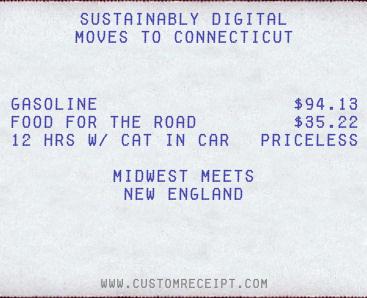This post includes information and additional resources for my presentation at the Connecticut Educators Computer Association (CECA) conference on October 18, 2010. The full conference schedule is available online, if you'd like to see the other sessions being offered.
[UPDATE: Several people requested information about how to access twitter from school if it's blocked. I added the info in its own section below.]
Presentation Title
The story of my (connected) life: Building your own network for professional learning
Description
Follow one educator's journey from online newbie to a well-networked teacher while exploring and discussing the possibilities for in-time, on-demand professional learning through online connectivity tools such as blogs, twitter, and more along the way. We'll explore how to create your own professional learning network that will allow you to share and connect to other expert educators from around the world.
The Slide Deck
The Rules
- Learn.
- It's about relationships.
- Jump in. Play around.
- Figure it out as you go.
- Share. Don't be shy.
- You don't need to read it all.
- Be patient.
- Reply. Converse.
- Follow people of interest.
- You don't need to do it all.
- There are no rules.
Resources
RSS & Google Reader
- Google Reader home
- RSS in Plain English (YouTube vid)
- Google Reader in Plain English (YouTube vid)
- Getting started with Google Reader
- Official Google Reader help page
Resources mentioned
- Personal Learning Network Diagrams
- The Alice Project - A self-directed learning & blogging project built around Alice in Wonderland, designed by Christian Long (@christianlong). It served as inspiration for the format of Project Climate (see below)
- Project Climate Blogs- The outward expression of student learning during a 4+ week self-directed learning project based around topic related to climate change.
- ClustrMaps- hit tracking & mapping service
- Words of Wisdom: The Line
- The post by Dina Strasser where she provides the Deborah Meier quote included in the presentation.
- Think Thank Thunk- Shawn Cornally's SBG focused blog.
- @WillyB- That's my twitter username. Feel free to follow.
Accessing Twitter from school (if blocked)
First, I recommend trying to get Twitter unblocked. Many times it's blocked by default without anyone really thinking over the benefits of leaving it open. These are all options I've used at one time or another, all with varying degrees of success. Many I haven't used in a long time, so your mileage may vary.
- Tip #1: Use FireFox
- Mozilla FireFox is a web browser that lets you add "plugins" that give it additional features. It also tends to work better than Internet Explorer. I've been able to convince my IT people to download FireFox on my school computer without too much effort1.
- Add Twitter Plugins to FireFox
- Tip #2: Use HootSuite
- If you can't download anything, you might try HootSuite. HootSuite is a web-based twitter application that has a nice set of features. Though Twitter has been blocked at various schools where I've tried, often HootSuite isn't. If it's not blocked, then you can get to your Twitter stream. HootSuite does require you to create an account, but it's pretty easy to do.
- Tip #3: Go big.
- This option might be frowned upon by many IT people & administrators, but from what I've heard it works exceptionally well. Of course, there is a price to pay (literally). WiTopia is a program that allows you to circumvent internet filters. It's primarily designed for those living in areas with a censored internet (i.e. China), though I've heard it works quite well at schools as well. The downsides are a) it costs $50, and b) it requires a download, which you may not be able to do on a school computer.
Please don't use any of these tips if they'll really tick off your IT people or violate state, federal, or local laws. 🙂
Personal Learning Network (PLN) Info
- Trailblazers
- Resources put together by Kristen Swanson explaining how and why to build a PLN
- Creating an Personal Learning Network : Educational Technology Guy
- As advertised- written by a Connecticutter (is that really a word?).
Education/Science Blogs I Read
- 2¢ Worth
- David Warlick's blog on educational technology. Warlick has been blogging about educational technology longer than I've known blogs existed.
- Action-Reaction
- Frank Noschese is a high school Physics teacher in New York. He blogs about his adventures in standards-based grading and physics education.
- Always Formative
- Another member of the standards-based grading borg, Jason Buell teaches middle school science in San Jose, CA.
- Apace of Change
- By Damian Bariexca, an English teacher turned school psychologist who also happens to be quite savvy with the instructional use of technology.
- apophenia
- Written by danah boyd, one of the premier thinkers/researchers on the subject of teens' use of social media.
- Bridging Differences
- A back & forth exchange between Deborah Meier and Diane Ravitch on education, policy, and reform.
- Deborah Meier's Blog on Education
- As advertised. Meier is on of my personal edu-heroes.
- Digital Ethnography
- Written by Michael Wesch, a cultural anthropology professor at KSU. He studies how we interact in and through online environments and is an amazing educator in his own right.
- Do I Dare Disturb the Universe?
- Scott Elias, now a middle school principal (& Apple Distinguished Educator) shares his thoughts on leadership, education, & technology.
- Drape's Takes
- Darren Draper is a director of technological services at a Utah school district and (if I'm not mistaken) is working on a Ph.D focused on teacher professional development.
- dy/dan
- Dan Meyer has taught math in CA and is interested in using digital media (among other things) to create meaningful learning experiences for students. He's gotten a lot of recognition lately, including a stint on Good Morning America & an interview on CNN. Currently a doctoral fellow at Stanford.
- Educational Insanity
- Jon Becker is an assistant professor at the Educational Leadership Department at VCU and knows a lot about school law, educational research, school policy, and the founder of the "data-is-a-plural-noun" posse.
- Ideas & Thoughts
- Dean Shareski is a digital learning consultant at a school division in Saskatchewan (easy to draw, hard to spell) and teaches at the University of Regina. He was awarded the 2010 ISTE Award for Outstanding Leadership in Technology and Education, which is kind of a big deal.
- ijohnpederson
- John Pederson is an Educational Technology Liason in Wisconsin who shares short, interesting, and sometimes quirky & irreverent bits of knowledge.
- in education
- A creative-commons licensed online educational journal that explores "our connective educational landscape."
- JoeWoodOnline
- Joe Wood is a teacher and instructional technologist from California. He's done quite a bit of work with Google Earth and helping teachers maximize the technology they have available to them.
- Mathalogical
- Sarah Cannon teaches math in South Dakota. I believe she might be currently working on an advanced degree in education policy.
- Megan Golding
- Megan Golding is a math teacher from Georgia who shares her thoughts and ideas on math and a variety of other subject.
- Moving at the Speed of Creativity
- Wes Fryer has been blogging, podcasting, and presenting about education for a very long time. He shares tools, tips, and insights into education and technology use.
- Nashworld
- Sean Nash, a biology teacher from Missouri, shares thoughts on teaching, pedagogy, education, and technology. Typically very insightful & interesting reading.
- Non-Inertial Teaching
- Brian is a physics teacher in Ohio who blogs about teaching physics and implementing standards-based grading (a system I switched to this year as well).
- Open Thinking
- Alec Couros is a professor of educational technology and media at the University of Regina in Saskatchewan. He's tweeted more times than any other one person I follow on twitter and is a education rockstar in his own right.
- Practical Theory
- Chris Lehmann is the principal of the Science Leadership Academy, a progressive, inquiry-driven high school in Philadelphia. He's an inspiring leader and advocate for children, learning, and schools. I'm really not sure how he fits everything he does into a 24 hour day.
- Quantum Progress
- John Burk teaches physics at a private school in Atlanta. He's a standards-based grading aficionado.
- /Re:thinking/
- OK, I don't really subscribe to this blog (because it's mine). I post irregularly on science education, reflections from teaching, standards-based grading, and whatever else strikes my fancy.
- Science Teacher
- Michael Doyle is an ex-pediatrician now teaching high school science. His beautifully written blog shares his thoughts on life, education, and living (among other things).
- Stager-to-Go
- Gary Stager (who happens to be the CECA 2010 keynote speaker) provides his thoughts on education policy and reform as well as articles written on computing in the classroom. He's been using technology in the classroom since I was just wee child.
- Teach Paperless
- Shelly Blake-Plock shares his vision and work to create student-centered, technologically advanced classrooms that empower students to take charge of their own learning.
- Teaching|Chemistry
- Ms. Bethea shares her thoughts and experiences from the chemistry classroom. A member of the standards-based grading borg.
- The Edge of Tomorrow
- Ben Grey does a lot of thinking about what schools and instruction should look like given the resources that are available to us. Good deep thinking shows up in his posts. Also, don't utter phrases like "media literacy" in his presence.
- The Line
- Dina Strasser is an all-star English teacher. She's one of my favorite bloggers- she knows her stuff and loves to share her experiences.
- Think Thank Thunk
- Shawn Cornally is an ultra-super-duper standards-based-grading enthusiast who teaches physics, calculus, and some programming. An excellent educator who focuses on learning before all else. His writing style (and links and hover text) is irreverent and awesome. He's from Iowa. He might turn into Cornally-Hulk if I forgot to mention that.
- WCYDWT-Science
- Inspired by Dan Meyer's (see dy/dan above) "What Can You Do With This" method of instruction, this is a group blog of science teachers posting videos and images that might be useful to spur student inquiry. Started up by Eric Brunsell.
- Weblogg-Ed
- Will Richardson has been a visionary thinker in the educational use of technology for a very long time. He's a super-blogger who will often get scores of comments on his blog posts. He provides plenty of food for thought.
- (worthlessness and wit)
- Daniel Agins teaches middle school social studies in Connecticut and is one of the few members of my professional learning network that I've met. There are a lot of good thoughts and ideas coming from his direction.
That's a lot of blogs (see Rule #6).
- Even though I didn't have the ability to download programs on my school computer, it did let me install FireFox plugins. If that doesn't work for you, I'd recommend talking to your IT people about changing some settings around. [↩]



















